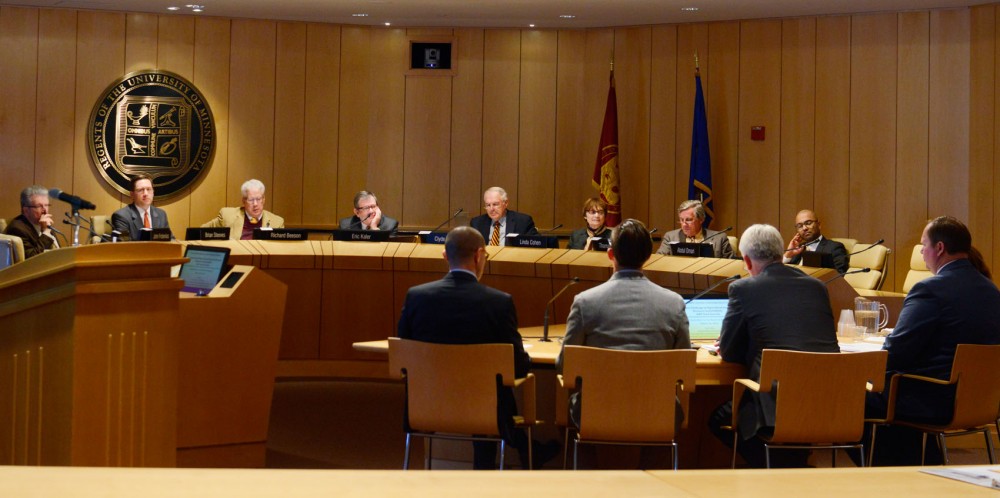The University of Minnesota’s Board of Regents has made it a little tougher to become one of its student representatives — but students leaders say in doing so, the board is overstepping its role.
Under policy revisions passed Friday by the board, only full-time students with a GPA of 2.5 or higher can be selected as representatives. While regents say it’s a fair expectation, some students oppose the measure, saying it weakens their voice in the selection process.
“The larger concern for me is the Board of Regents dictating who students can select for students,” said Matt Forstie, chairman of the Minnesota Student Legislative Coalition. “[The policy changes] really infringe on the decision-making rights that the students have.”
The Minnesota Student Association and Graduate and Professional Student Assembly join each spring to choose four student representatives from the Twin Cities campus to serve the following academic year. One student is selected from each of the University’s four other campuses by their student governments.
The student representatives offer opinions to the board but don’t vote on official measures.
At the Friday board meeting, regents briefly discussed the policy before unanimously approving it. Those who spoke said the GPA requirements are necessary because students who seek these positions should already be proficient in their studies. They said the change shouldn’t negatively affect the process.
“This additional service, while important, is secondary to the academic progress of their making, and we think it’s a reasonable threshold to meet,” said Board Chair Richard Beeson.
Previously, there was no GPA requirement for student representatives. The board originally proposed a 3.0 GPA requirement in February but later lowered it after voiced opposition.
Despite the compromise, student representatives to the board said they wish they would have had a more open dialogue with the board before it voted to tighten the regulations, adding that they would have preferred talking with the regents directly rather than going through the board’s office.
“I feel like it passed pretty quickly and there was very little discussion,” said Joelle Stangler, MSA’s ranking representative to the board.
She said while setting academic standards isn’t bad, it narrows the application pool and could potentially disqualify capable students.
“It puts us in a very awkward position because we know that that person’s the best, and then there’s this arbitrary standard being put in place,” she said.
Joseph Daniewicz, vice chair of student representatives to the board, said the GPA requirement is “troubling” and creates a negative stigma for students who fall below the mark.
“I’m incredibly disappointed that it passed,” he said.
The new policy change also eliminated the alternative student representative position — someone who serves as a substitute when representatives are absent — a move also contentious with the student associations.
But students didn’t oppose all of the changes. The expectations for the representatives, like requiring attendance and clarifying how much time the job requires, are clearer in the new policy and will help applicants be more aware of what they’re signing up for, said Meghan Mason, chair of student representatives to the board.
The regents’ main motive for passing the policy changes was to set clearer expectations, Regent Abdul Omari said.
Beeson said having students’ fresh perspective on the University is an important part of the governance structure.
“Having somebody connected at different parts of the life cycle is really good,” he said.


